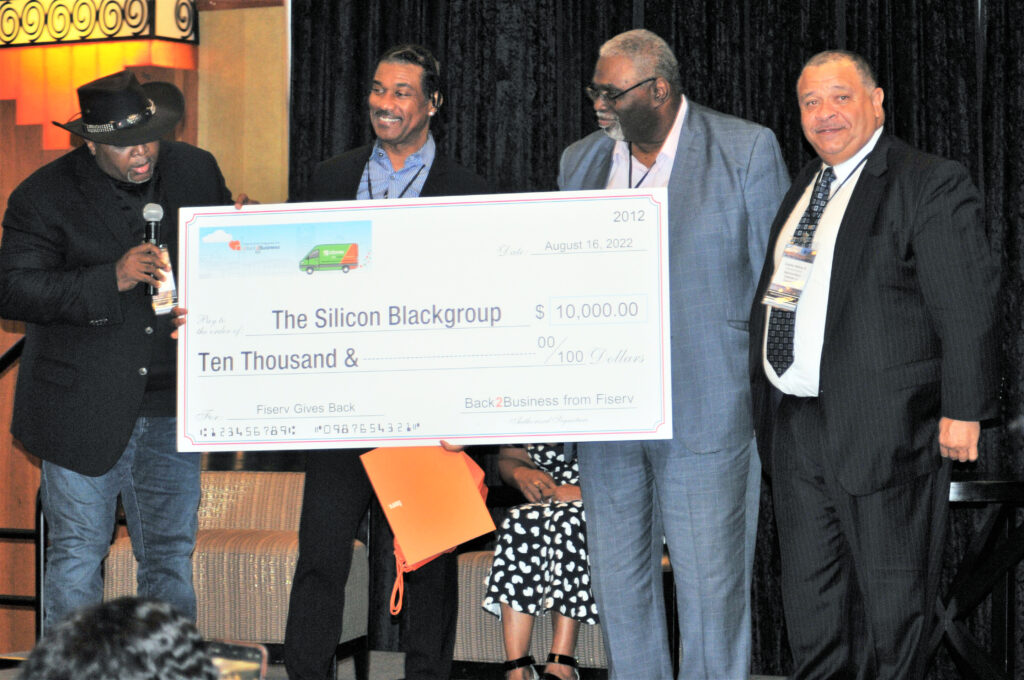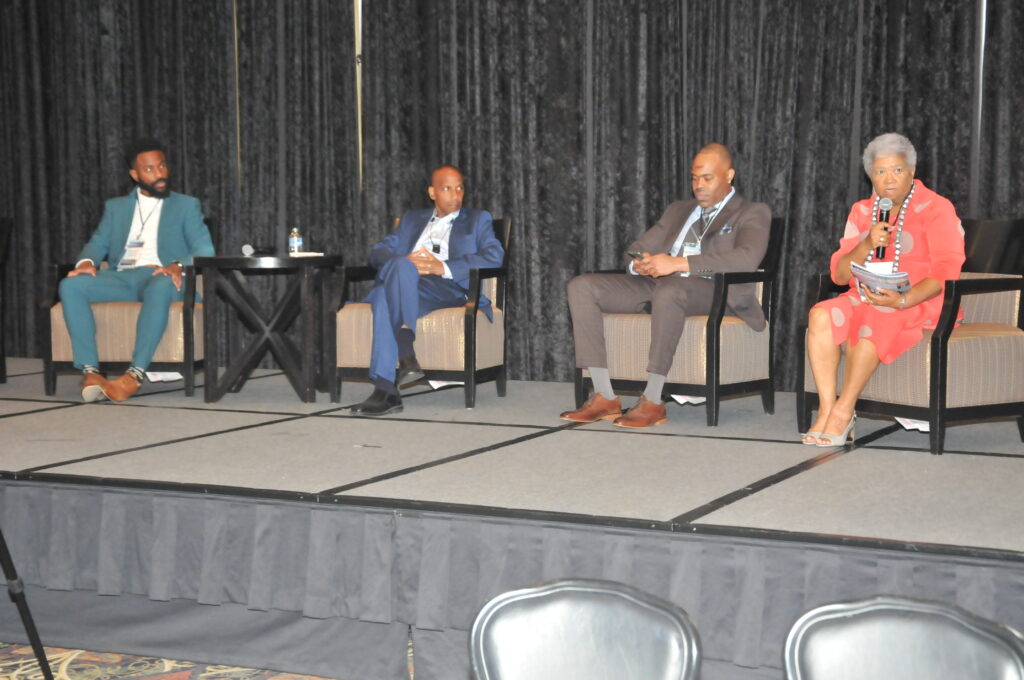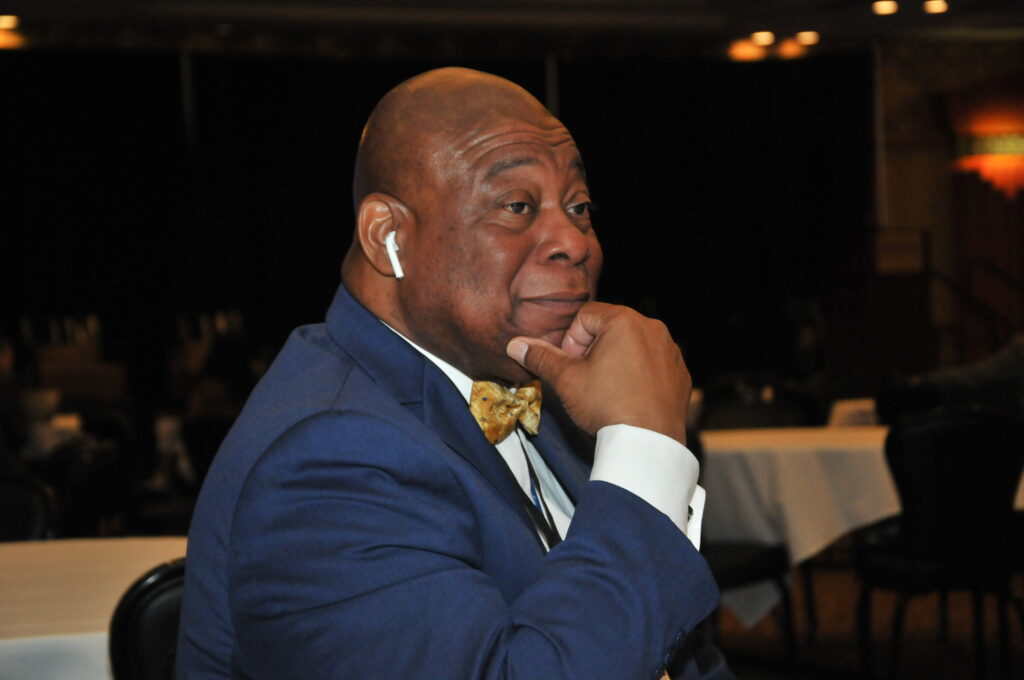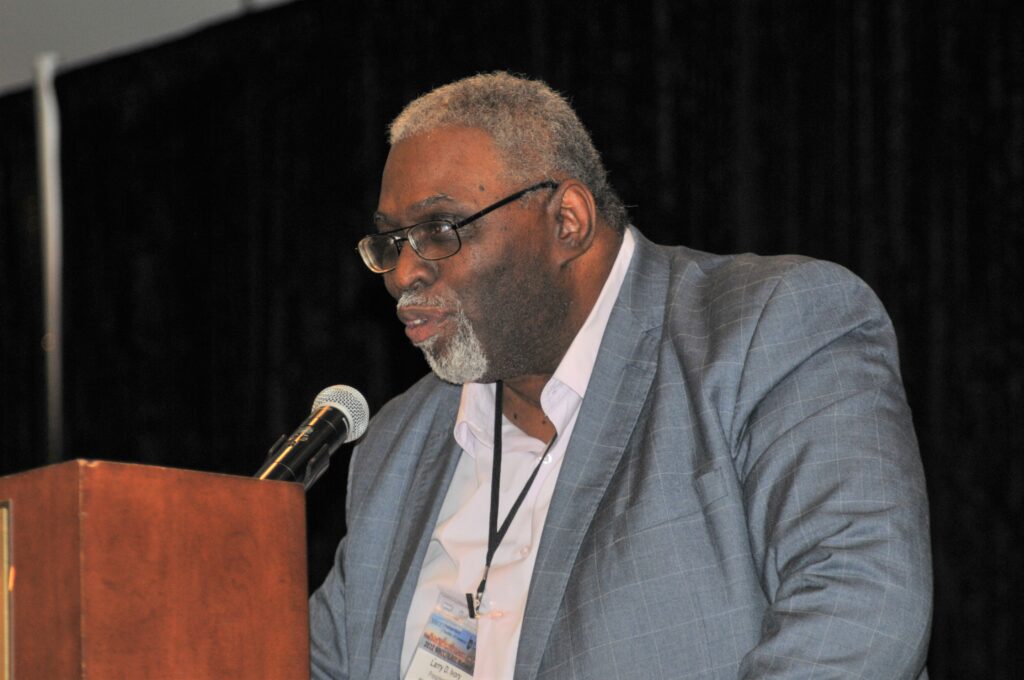CHICAGO—The only way Black businesses can survive and thrive is when they work in cooperation instead of competition, said organizers of the Illinois State Black Chamber of Commerce Annual State Convention held recently.
Under the leadership of Larry Ivory, the Chamber’s president and CEO, the organization celebrated 25 years of empowering Black businesses in Illinois and beyond with a variety of workshops, one-on-one corporate matchmaking sessions, and informative panels. This year’s gathering was held in conjunction with the National Black Chamber of Commerce.
“The only way from poverty to prosperity is normally through entrepreneurship. If we strengthen Black businesses, we strengthen Black communities. We want to empower our people,” said Mr. Ivory.
Black businesses do much more than possibly create generational wealth for themselves. In many cases, Black-owned businesses address problems with systemic oppression and lack of access, such as the restaurant or coffee shop in a struggling neighborhood or convenience store showcasing Black-owned products.
Additionally, Black businesses provide goods and services that reflect everyday needs and interests of Black consumers. They employ Black people and help the dollar circulate within the community before it trickles out.
The Chamber plays an important role in helping Black businesses in Illinois succeed through developing strategies to assist them in increasing their competitive ability and capacity.
Roughly 400 businesses attended the three-day convention held in a hotel right off the Illinois River in Peoria, Ill. The convention’s first day included a one-on-one matchmaker session where businesses could pitch to various major corporations followed by panel discussions about operating globally during a pandemic.
Some 50 corporations showed up as matchmakers and sponsors including Comcast, People’s Gas, ComEd, Verizon, United, JPMorgan Chase, several major airlines and many more.
Fiserv, a multinational, financial technology service company awarded three $10,000 grants to deserving Black businesses that along with the money, included technical support and mentorship as well.

“This conference is designed for Black people and Black businesses. It’s about bringing companies together who are willing to do business with Black businesses,” said Mr. Ivory. “We created a forum that will help them be successful, everything from capital access to credit to international trade; the whole gamut.”

One panel that had attendees’ attention was presented by credit expert Dr. Michael Grayson, CEO of Credit and Debt Management Institute, Inc. (CDMI). Using his proprietary FICO Restoration Formula, Dr. Grayson currently holds three credit industry records. One record is for getting one of his clients to a 990-credit score.
“Every business owner should have a 720-credit score. If you build credit into your business, whether you are successful or not, you have access to capital,” said Dr. Grayson. “Every American, if you hit a 720-credit score, you are a millionaire. You just don’t know it.”
Although there has been an upswing in the success of some Black businesses, overall, there has been a dramatic dip in the number of Black businesses. In 2012, according to the U.S. Census, there were 2.58 million Black businesses, but that number decreased to 1.1 million by 2020. Then–once the pandemic hit–just two months later, that number had fallen to 640,000.
While all businesses experience various levels of risk and the ups and downs of revenue are common, Black entrepreneurs historically face unique, doing-business-while-Black, obstacles that make it more difficult to reach the same level of success as their competitors. These barriers include limited access to startup capital, lack of a solid network and mentors, and operating in lower-revenue industries, and lack of access to technology. Black entrepreneurs face obstacles such as limited access to startup capital, and less managerial and industry experience.

Events such as this provide much needed resources and opportunity that Black businesses need. Some businesses are only one resource away from tremendous success.
One such resource is Global Diversity Export Initiative which empowers and equips diverse, often underserved U.S. businesses classified as minorities to compete and win in global markets.
“Ninety-two percent of whom we help are small to medium sized businesses. You don’t have to be a large multinational already to play in the global market,” said Terri L. Batch, director of the Initiative housed in the U.S. Department of Commerce International Trade Administration.
This federally subsidized initiative offers a variety of support, most of it free of charge. This includes expert counseling, market intelligence, business matchmaking and commercial diplomacy.
“By being a member of the Illinois Black Chamber of Commerce under the illustrious leadership of Brother Larry Ivory, I see opportunities to enter into international trade and commerce. So, I came to this convention to meet members who are on the international trade and commerce committee,” said Wali Muhammad, owner of the Criterion Group, LLC, a medical supply company.
“And of course, as our Lessons (in the Nation of Islam) teach us, big fields await the wide-awake man to work out in. I’m not saying I’m wide awake, but I can see a big field, so I wanted to be here to learn, to listen and to grow in accepting our universal responsibility in the Nation of Islam,” added Mr. Muhammad.

The Most Honorable Elijah Muhammad and the Nation of Islam for decades has taught the importance of Blacks “doing for self,” in trade, national and international commerce as a way to secure our future. “We’re going to have to get up from where we are and go to work in order to survive and in order for us to prepare a future for our children,” the Honorable Minister Louis Farrakhan noted in a message themed, “Business is Warfare,” delivered October 16, 2011. He also spoke on the importance of land acquisition in these efforts.

“If we are not the owners of land, andlots of it, then we will not be able to produce the things that we consume. So we will always be at the mercy of others who produce, and therefore we will be the consumer people rather than a productive people! And that is how people earn “respect,” by being productive,” the Minister stated.
“We have to have land. We have to have the intelligence to extract raw materials out of the land to make products that are useful to ourselves and others. If we can produce products that are useful to ourselves, what then does the Honorable Elijah Muhammad mean by ‘sell the surplus’? We look out for our own needs first, then whatever you have over you sell it to others! This opens up a field of ‘trade and commerce,’” he added.
A large portion of the first day of the Illinois State Black Chamber of Commerce Annual State Convention held Aug. 16-18, included a panel focused on doing business in a global, post pandemic environment. Business representatives from Nigeria, Ghana, Senegal, Sierra Leone, Costa Rica and Colombia added to the conversation about international trade and commerce.
“Black people in (North and South) Americas have similar cultures, and we are in the same situation,” said Igor Correa, who attended the convention representing his country, Colombia. “We’ve been working and paying a lot, but we don’t have a plan to come together, although we have 200 million people who could trade together.”
The convention reflects the work the Chamber does all year. “Since our inception we have seen steady growth and have worked with businesses and government agencies alike to help craft solutions in areas that directly help reduce economic disparity for our citizens and communities,” the Chamber explains on their website.
For more than 22 years, the Chamber has helped to create sustainable opportunities for Black Americans, women, and minority-owned businesses alike. They have advocated for over 100,000 Black-owned businesses that represent an extremely diverse slice of industries from all across Illinois.

Black Chamber of Commerce.
Photos: Haroon Rajaee
Our vision is to help Illinois Black businesses to become sustainable, high-growth enterprises by assisting them with building their capacity, allowing them to compete effectively in local, state, federal, and commercial contracts, Mr. Ivory explained.
Sustainable business development happens quicker when the right markets are chosen. Too often, Black business owners choose highly competitive and low revenue industries such as barber shops and beauty salons. This offers less opportunities to employ others. As a result, of the 1.1 million employer businesses in the United States in October 2020, 134,567 were Black owned, according to the U.S. Census.
And 96 percent of Black-owned businesses were nonemployee firms, compared to 80 percent of all small businesses.
Dr. Jeffrey E. Sterling urged attendees, especially young and new entrepreneurs and even established ones, to get into the healthcare industry. “If you aren’t trying to do business in health care, you aren’t serious about doing business,” said Dr. Sterling who is a physician, entrepreneur and international leader in community-based medicine, health care, and public health.
“There is not a single Black-owned hospital in the state of Illinois. That blows my mind. Health care is the largest industry in the United States. Over $4 trillion dollars a year is spent in health care. One out of every $5 dollars that is spent in this country is spent in the healthcare industry. You don’t have to be a doctor, you don’t have to be a nurse, you don’t have to be a scientist to get some,” explained Dr. Sterling.
For example, a hospital will need food services, waste disposal, cleaning services (janitorial and laundry), building maintenance and other services performed on a daily basis.
“We have got to systematically address these opportunities,” he added. “We are systematically oppressed, systematically being killed off, by design, by happenstance, it doesn’t really matter how it has occurred, the truth of the matter is that is has been occurring, it is occurring and until we do something about it, it’s not going to change.
Dr. Sterling is president and CEO of SIMPCO, LLC, America’s first managed preventive care organization. SIMPCO is championing global implementation of public health best practices for health prevention and promotion, empowering citizens to be better stewards of their own care, he explained.
Another key industry to get into is technology. “For Black people, (technology opportunities) are means to an end for changing the way we live,” said Reggie Rush, vice president of DivIHN, a technology solutions company. “Corporations are struggling trying to find new ways to find new talent.” (Final Call staff contributed to this report.)













